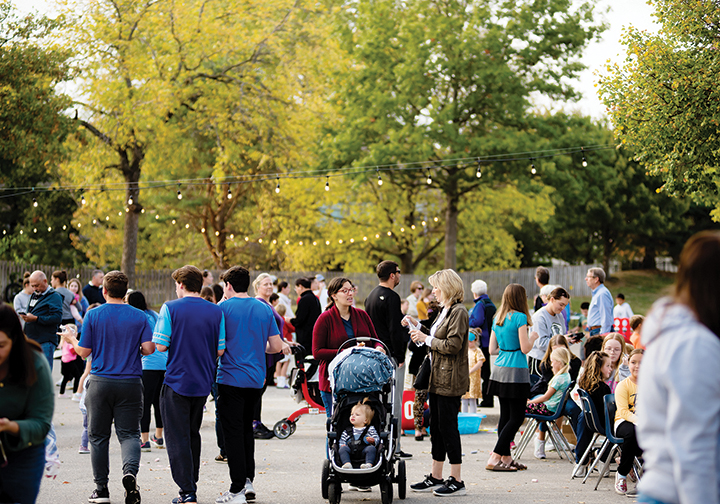
by Therese Horvat
Special to The Leaven
KANSAS CITY, Kan. — In a culture where marriage rates are declining and rates of divorce are increasing, 11 parishes across the archdiocese are striving to reverse these trends by investing in ministries to strengthen marriage and family life.
Through a highly focused process, they are hosting enriching and enjoyable events, offering programs to build relationships. Relying on the Holy Spirit, teams of volunteers and staff support ambitious mission plans.
Their efforts are producing tangible, positive results. These parishes have sponsored creative opportunities ranging from “Toasting the Saints” to “Adoration Under the Stars,” from date night challenges to a family field night, and from a Valentine’s Day cooking class to a beer tasting get-together. Events have often attracted strong attendance and excellent participation.

Most importantly, as perceived by Marissa Brown, minister for marriage, family and vocations at Church of the Ascension in Overland Park, couples have shared that they are communicating for the first time in several years, they are sleeping together again in the same room and they are having meaningful conversations as they spend intentional time together. Additionally, previously inactive parishioners are becoming involved.
Since summer 2022, these 11 parishes have adopted and implemented Communio, a national initiative that trains and equips churches to evangelize through the renewal of healthy relationships, marriages and the family. Father Scott Wallisch, pastor of St. Joseph Parish in Shawnee, elaborates.
“Communio seeks to strengthen the church and to have a positive impact on society by giving married couples the tools, encouragement and formation to have good, strong and healthy marriages, and thereby to foster healthy families,” he said. “The stronger their marriages, the more likely couples are to live their faith and to hand it on to their children in ways that are compelling.”
Intentional engagement
The Communio framework encourages parishes to offer a steady stream of ministry events and programs throughout the year. Large scale outreach events target building relationships within the parish and with the broader community.
At its 2022 fall festival, for example, Church of the Ascension attracted approximately 1,300 people, almost 10% of whom were from outside the parish. Sarah Kroger, a Catholic worship leader and songwriter, drew 400 parishioners and other guests to a concert hosted by Sacred Heart, Sabetha; St. Augustine, Fidelity; and St. James, Wetmore.

Other events encourage ongoing engagement. The date night challenges fall into this category. Annie Deters, director of adult faith formation at the three rural parishes in Sabetha, Fidelity and Wetmore, explained that couples register as participants, go on dates and enter their names into a drawing for prizes. Deters provides date suggestions and conversation starters.
At a Valentine’s date dinner at St. Joseph Parish in Shawnee, 25 couples enjoyed a meal, a presentation on a marriage theme and time for discussion.
Father Wallisch describes the growth journey level of programming as the heart of Communio, as couples invest significant time together to strengthen their marriages. Deters was hopeful that at least six couples would attend a seven-week Saturday morning marriage course in Sabetha. When 27 couples registered, the ministry team reconfigured space to accommodate large group presentations and video sessions for individual couples.
For a similar program, Ascension had 24 couples in-person and another 47 couples participating virtually.
As they enter year two of their three-year Communio engagement, marriage and family life ministry teams are repeating and tweaking some first-year offerings and tying into existing parish events by adding an evangelization or faith dimension to a social or recreational activity. This can be as simple as distribution of a prayer card. After three years of adopting and adapting the Communio model, the goal is that parishes will continue the marriage and family ministry tailored to the needs of their distinct communities.
Lessons learned
“What’s happening in our culture with marriage and family life is not going to self-correct,” said Tory Baucum, Ph.D., director of the Center for Family Life at Benedictine College in Atchison, and Communio liaison with the archbishop and pastors.
“We need to encourage a mindset and a set of catechetical habits to rebuild marriages and families,” he said. “Communio provides a tried and proven approach based on its expertise and experience with churches.”
While initially overwhelmed by the Communio model, Deters realized early on that the rural parishes she serves couldn’t dwell solely on increased attendance at events to measure success. She focuses on the expressed hunger and desire of participants and the fact that people are having faith conversations and want to be involved in small groups. Others are being inspired to return to church. Increased Mass attendance is a measurable Communio goal.
“More people are investing in making our churches more welcoming,” Deters added. “We would like to create a situation where families and couples are so interconnected that they don’t feel alone when they’re facing crises.”
At Ascension, Brown is passionate about helping bring people to a happy place in their marriages. She appreciates the regular contact and communications with the Communio consultant assigned to her parish.
Father Wallisch encourages patience with numbers in the first year as a Communio parish. He cites many benefits from the initiative.
“People are noticing we’re making a more concerted effort to address community and to strengthen marriages,” he said. “We’re helping new parishioners get to know one another and to know that we care about them and want them to succeed.
“Communio compelled us to invest time, money and resources toward strengthening marriages and families,” he said.
“We need to accept that we are planting a tree that we will not sit in the shade of,” Deters concluded. “We’re investing in the future of marriages and family life and our faith.”
Becoming a Communio parish
• Parish expresses interest to Communio or archdiocese.
• Communio and the archdiocese connect with the pastor and parish leadership to explain the Communio framework and help discern expectations for success.
• Parish participates in Communio data analysis, including a first-party survey and modeled data, to uncover ministry opportunities and challenges.
• Communio provides in-person training for staff and key volunteers to set mission outcomes activities and to create an initial 12-month plan for outreach and engaging key demographics.
• Parish launches plan, tracks results, builds a task force, implements outreach and marketing, begins to help parishioners and individuals in the community integrate more into the parish and relationship health content.
• Each parish has a Communio consultant who walks through the entire process as needed, step by step.
• Parish tracks results to measure effectiveness and adjusts.
To learn more
Parishes interested in Communio can contact:
• Jared Smyth, vice president of church engagement, at (720) 231-4744 or at: jsmyth@communio.org
• Archdiocesan office of marriage and family life — Brad and Libby Dupont — (913) 647-0301, or at: bdupont@archkck.org or ldupont@archkck.org






